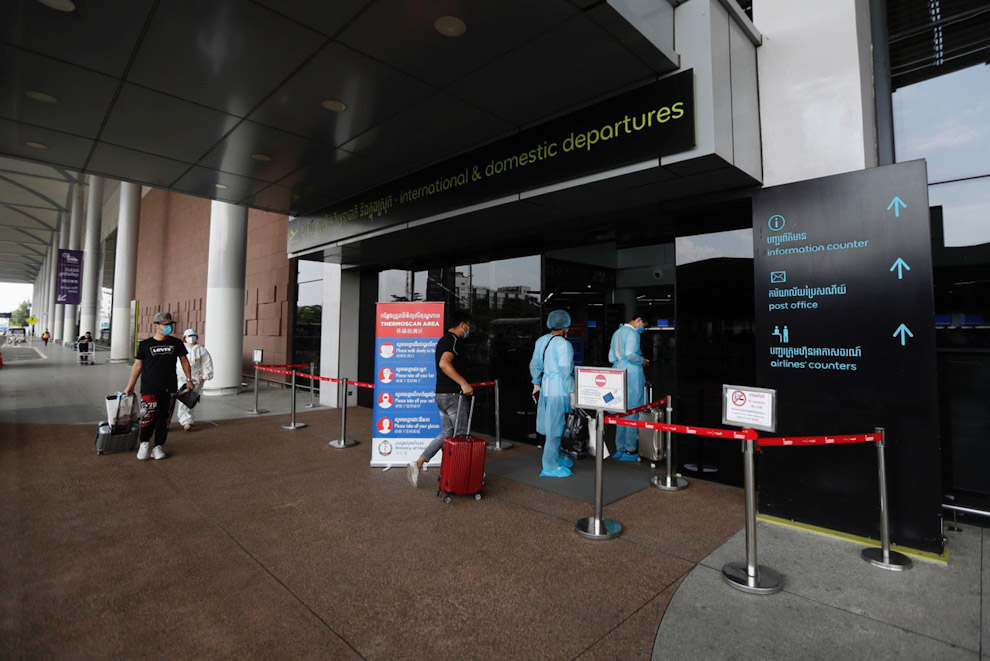Cambodian citizens returning from abroad will be exempt from the government’s requirement that travellers entering Cambodia bring a certificate proving that they tested negative for a Covid-19 infection, according to Prime Minister Hun Sen.
Hun Sen wrote on Facebook on Wednesday that Cambodian citizens would no longer be held to the same stringent entry requirements as foreigners trying to enter Cambodia, who require a certificate granted up to 72 hours before entry and also medical insurance covering them for up to $50,000 in expenses.
“The move will facilitate overseas citizens to return to their families,” he wrote.
However, the prime minister said those citizens would still be required to undergo a 14-day quarantine or self-isolation period and then a medical exam. All arrivals would also still be checked for coronavirus, he wrote, with those testing positive put into quarantine and those testing negative asked to self-isolate.
On May 20, the government lifted its ban on entry to the country for travellers from the U.S., France, Germany, Italy, Spain, and Iran — nearly two months after it imposed the restrictions in the wake of the global outbreak of Covid-19.
Chea Aun, the spokesman for Cambodia’s State Secretariat of Civil Aviation, said it would still be a strict process for citizens of those nations to enter Cambodia.
“We do not ban the airline flights, but we have restrictions based on the conditions that the Ministry of Health has issued,” Aun said. “It is because of our concerns that we have been made to put in place these limited conditions.”
Aun added that citizens from countries like the U.S. were already returning.
“Now, flights can come from China and Korea — and the flights from South Korea have a mix of nationalities, including Cambodians who worked in Korea and some passengers from the United States of America,” he said.
“The government has taken good measures for Covid-19 prevention.”
According to Health Ministry statements issued on May 21, 23 and 30, three more people have recently tested positive for coronavirus bringing Cambodia’s total to 125 people after weeks of no cases being officially recorded and almost all those infected having recovered.
The first new case was a 26-year-old man from Kampot province’s Kampong Trach district who returned from South Korea via the Philippines, while the second was a 39-year-old Cambodian woman living in Toek Thla commune in Phnom Penh’s Sen Sok district, the ministry said. The third case was a 26-year-old man from Tboung Khmum province’s Tboung Khmum district who had travelled from a religious school in Thailand’s Yala province before returning across the Cambodian border, where he was tested, on May 28.
Defense Ministry spokesman General Chhum Socheat also announced on his Facebook page on Saturday that seven Cambodian peacekeepers currently in Mali had contracted coronavirus. One of the infected Cambodian peacekeepers, Major General Sar Savy, died from the Covid-19 disease on May 29, Socheat wrote.
“Gen. Savy’s death was a great sacrifice to the Cambodian military in its humanitarian missions under the umbrella of the United Nations, and a great loss for the nation’s outstanding armed forces,” Socheat wrote.
In Cambodia, the Health Ministry has been slowly advising the re-opening of public spaces as the official case count has slowed, with the National Museum in Phnom Penh again allowed to accept visitors from May 15, so long as temperature checks are taken from those entering, masks are worn and hand sanitizer is provided.
The Inter-Ministerial Committee to Counter the Covid-19 Disease also issued a statement on May 22 allowing the reopening of sport events — so long as no spectators can attend and no more than 100 players and officials are involved.
Pa Chanroeun, the director of the Cambodian Centre for Applied Philosophy and Ethics, said he believed the government was doing the right thing to start to lift Covid-19 restrictions as it was becoming clear that the economy had suffered. In particular, he praised the decision to now let Cambodians return home freely.
“I congratulate the government for allowing Cambodian citizens to return to Cambodia without having a health certificate or health insurance because, in fact, Cambodia is their homeland, so if we do not allow them to enter, it’s a problem,” he said. “It’s the right decision, and it’s a decision that fits with the Constitution.”
However, he said he was concerned a full reopening could take place too quickly and lull people into a false sense of security, leading to a future outbreak.
“I ask the government to please push people to continue to keep up their sanitary activities, because based on what the WHO has raised, we have to be careful about the second wave of the Covid-19 disease,” Chanroeun said.
Soum Chankea, a coordinator for local rights group Adhoc in Banteay Meanchey province on the Thai border, said Thailand had still banned travel from Cambodia but that many Cambodian migrant workers were already trying to return there.
“Some migrant workers are still going into Thailand through the unofficial border checkpoints and some of them have been detained by the Cambodian authorities to be educated and advised before they are allowed to go home,” Chankea said.
Banteay Meanchey provincial governor Um Reatrey declined to comment when reached by telephone. However, in local online news, provincial authorities were quoted saying that they appealed to migrant workers not to try to illegally return to Thailand yet and to remain home until the Covid-19 crisis had passed.








